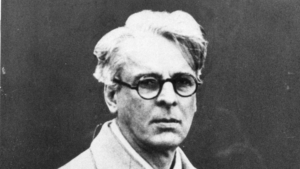 For Anne Gregory
For Anne Gregory
W. B. Yeats
By Norah Christianson
For Anne Gregory
- B. Yeats
‘Never shall a young man,
Thrown into despair
By those great honey-colored
Ramparts at your ear,
Love you for yourself alone
And not your yellow hair.’
‘But I can get a hair-dye
And set such colour there,
Brown, or black, or carrot,
That young men in despair
May love me for myself alone
And not my yellow hair.’
‘I heard an old religious man
But yesternight declare
That he had found a text to prove
That only God, my dear,
Could love you for yourself alone
And not your yellow hair.’
*Ramparts – a defensive wall of a fort—here a metaphor for her hair that covers her ears like ramparts cover a castle—her hair screens her from her inner beauty being seen.
Anne Gregory was the grand-daughter of Lady Gregory, a very close friend of Yeats. Yeats’ little poem can be taken two ways. It is genially, sweetly humorous, whimsical—it makes you smile. But it also raises a philosophical question about romantic love, which is so frequently irrational. There’s no denying that humans are attracted to people who are attractive. They are drawn to certain qualities they see in a person, and the first quality they see is what a person looks like. We may object to assessing a person this way, it may seem shallow and trivial. But it’s what we do. (I’m reminded of the lyrics of Roberta Flack’s song: “The first time ever I saw your face/I thought the sun rose in your eyes/ And the moon and the stars were the gifts you gave….”)
The poem “For Anne Gregory” is a conversation between the poet and Anne, in which Anne objects to being loved only for her yellow hair—she wants to be loved for herself, for her whole person. But Yeats insists that only God could love her for herself and not her yellow hair. Some would see this as insulting or, at least, disturbing. Indeed, a feminist would get in a fit. But I see this as a lighthearted humorous rejoinder.
This whole issue about beauty and love/desire reminds me of a young woman I worked with in the 80’s. She was so beautiful, so stunning, that not just men, but women and dogs would turn to admire her. She once told me, and aggrievedly, that when men fell in love with her—and they did so quickly—they did not even try to know her. They just desired her physical self. Not ever being gorgeous myself, I was stunned that such a beautiful girl could be sad about being beautiful—until I got it. She had the anxiety of a beautiful woman who is afraid she will never be loved for who she is. Being loved only for your beauty would be like being loved as an object—say a beautiful Monet or a Tiffany diamond.
William Butler Yeats (13 June 1865 – 28 January 1939) was born in Sandymount, Ireland. He was a dramatist, writer and politician who helped to found the Abbey Theater. In his later years, he served two terms as a senator of the Irish Free State. Yeats was awarded the Nobel Prize in Literature in 1923. Just so you know, Yeats loved a woman, Maud Gonne, for years and years. He proposed to her in 1891, 1899, 1900, 1901 and 1916. She always said no.



